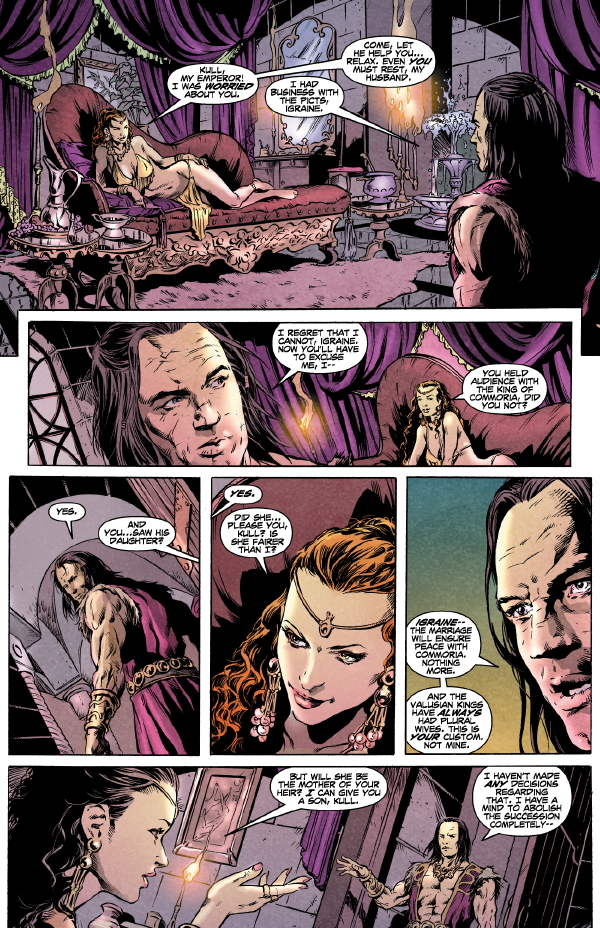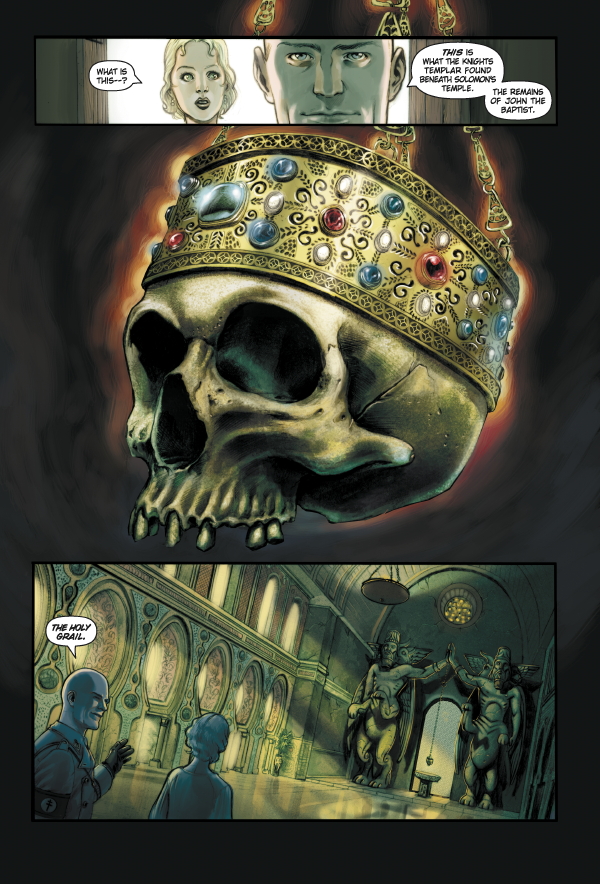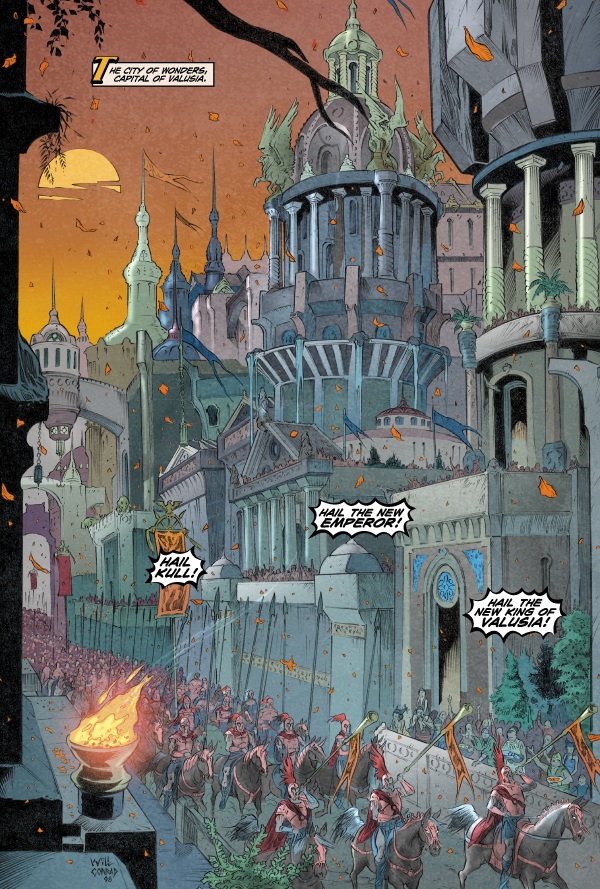 Arvid Nelson (Zero Killer, Rex Mundi, Kull) is known for his use of intricate plot that puts his comics on the level of an epic novel. Some critics have even gone so far as to say his Rex Mundi series is more detailed in terms of Christian Mythology than The Da Vinci Code.
Arvid Nelson (Zero Killer, Rex Mundi, Kull) is known for his use of intricate plot that puts his comics on the level of an epic novel. Some critics have even gone so far as to say his Rex Mundi series is more detailed in terms of Christian Mythology than The Da Vinci Code. With Rex Mundi coming to a dramatic end this year and Zero Killer . . . well . . . more news on it soon . . . , Nelson will focus on making Kull one of the best comics on the shelves, proving a story about barbarians can also be quite intellectual.
Dark Horse recently got the chance to ask Nelson about his projects, the movie deal with Johnny Depp, and how his faith helps shape his stories.
Dark Horse: How did you get your start writing comics?
Arvid Nelson: I got kicked out of a band senior year of college. I was sort of scrounging around for something else to do with my life, and I fell in with a great new set of friends. Our ringleader, Billy K., had a great idea: form an official college “comic book club”, make a comic book, and then get school to pay for it. It actually worked! The fools! It was a very happy time, staying up until four in the morning, terrorizing drunken frat boys, and engaging in clandestine warfare with the college “humor” magazine, with whom we shared production space. One night close to graduation Billy said, “Wouldn't it be great if we could do this for a living?” Things just fell into place after that.
DH: Both Rex Mundi and Kull have very dense plots for a comic book series, why do you intertwine so many characters?
AN: I guess for me there's no such thing as “mindless entertainment”. Even action movies -- especially action movies -- have to be smart to be entertaining. The Dark Night, for example. And “smart” doesn't mean “inaccessible”. Quite the opposite. So, I try to make my stories intricate. But they're only successful if they have broad appeal.

DH: Rex Mundi has had a couple different artists, and recently has been drawn by Juan Ferrerya, whose work, I think, best captures the mood of the series. How and why did you decide to work with him?
AN: Juan's involvement is due solely to Jim Di Bartolo, the artist who did Issues 14 and 15 while Rex Mundi was at Image. Jim and I both liked Juan's art for another Image comic, Small Gods, which just happened to be winding down. Jim lobbied Juan really hard. It was a good thing, too. I was on the verge of walking away from Rex Mundi at the time. I'm extremely grateful for Juan, and I owe it all to Jim.
DH: Do you approach Kull in a different manner than Rex Mundi because the character is a Robert E. Howard property?
AN: Yeah, absolutely. Kull is a licensed character. The guys at Conan Properties have expectations, Dark Horse has expectations, and most of all, readers have expectations. My job writing Rex Mundi is . . . writing Rex Mundi. My job writing Kull is satisfying expectations and writing action-packed stories. Kull's character is less established than Conan's, so I have to make some interpretive decisions. But the goal is always staying true to Howard.

DH: With Kull, you’ve shown an outsider struggling to keep a kingdom together, almost an opposite plot to Rex Mundi, where people are attempting to bring down the-powers-that-be. Which of these themes are more fun to work with?
AN: Hey, good point! Really, no theme is any more or less interesting than another. It's all what you make of it!
DH: You’ve stated that much of your writing is inspired by your Baha’i faith. Can you expand on how Rex Mundi is, in some ways, a religious metaphor about the coming together of different sects?
AN: Bahá'ís believe the founder of their faith, Bahá'u'lláh, is the messenger promised by every world religion, from Buddhism to Islam. Although it's just as accurate to say Bahá'u'lláh's coming is foreshadowed in Hinduism, or even Zoroastrianism, I'm most familiar with Christianity. So Rex Mundi overtly deals with Christian themes and symbolism. But on a deeper, metaphysical level, it also relates to Bahá'í. The Holy Grail is the central theme of Rex Mundi, and the final “secret” of the Grail, which will be revealed in Issue 17, is a metaphor for the spiritual revolution that's happening right now.

DH: There’s been a lot of chatter about Johnny Depp and screenwriter Jim Uhl (Fight Club) adapting Rex Mundi into a movie. Can you give us any details?
AN: My understanding is the second draft of the screenplay is done, but not everyone has had a chance to take a look. So we're in a holding pattern for now. That's how it seems to go, there are long periods of inactivity punctuated by sudden bursts.
DH: With Rex Mundi coming to an end, what direction do you see yourself taking Kull?
AN: Kull is going to be epic! Every story arc will self-contained and completely satisfying, but each is a building block in a larger saga. Kind of like Voltron. The lions are pretty sweet on their own, but when they form Voltron . . . it's totally sweet.

DH: Who inspires you as an artist?
AN: Guy Davis. Guy did an eight page Rex Mundi short story. Now I can officially blow the back of my head off with a 12 gauge and a smile on my face.
DH: If you could meet any person, living or dead, who would it be?
AN: I'd love to meet Clark Ashton Smith. He was a writer, a contemporary of Howard and Lovecraft, but he's not as well remembered. For some reason. It's too bad, because he's my favorite of the three. I'd also like to meet Bahá'u'lláh, Abdu'l Bahá, or Shogi Effendi, three central people in the Bahà'ì Faith. Shogi Effendi passed away relatively recently, in fact. One of the many things I love about Bahà'ì is the sense that religion is a living, breathing, immediate thing.
Rex Mundi can be complicated to jump into without some background knowledge. While this makes for a terrific story, you may find that some of the religious allusions are unfamiliar. Nelson has created a great site (rexmundi.net) where you can brush up on your religious history and immerse yourself completely in the series. Check it out by clicking here. Also, read the DH.com exclusive Rex Mundi: Hill of Martyrs eComic while you're at it.